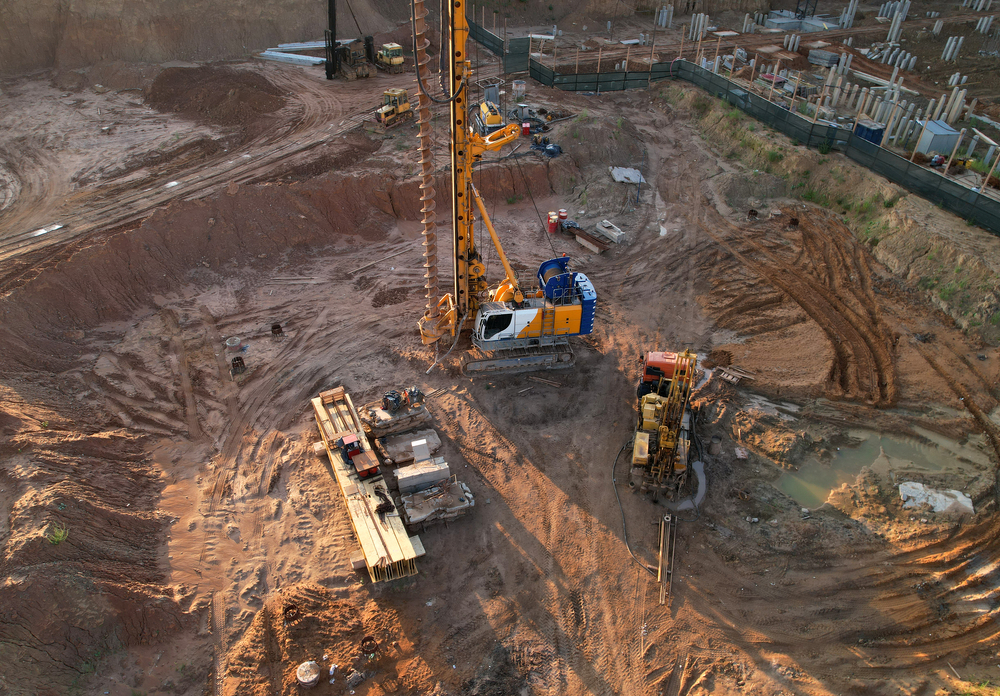A Biased View of Geotheta
A Biased View of Geotheta
Blog Article
Geotheta Things To Know Before You Get This
Table of ContentsSome Ideas on Geotheta You Should KnowThe Geotheta IdeasThe Basic Principles Of Geotheta Geotheta Can Be Fun For AnyoneThe smart Trick of Geotheta That Nobody is Discussing

They conduct website investigations, collect samples, perform laboratory examinations, and examine information to evaluate the viability of the ground for building and construction jobs - Consulting Engineers. Based on their searchings for, geotechnical designers offer referrals for structure style, incline stability, maintaining frameworks, and reduction of geotechnical threats. They team up with various other professionals, such as engineers, structural engineers, and construction teams, to guarantee that geotechnical considerations are incorporated right into the total job style and application
By analyzing the habits and homes of soil and rock, they can identify potential geotechnical threats such as landslides, dirt negotiation, or slope instability. Their proficiency assists avoid failures or crashes that might threaten lives and property. Right here are some comprehensive tasks and obligations of a geotechnical engineer: Website Examination: Geotechnical engineers conduct site investigations to gather data on subsurface problems.
They analyze the information to recognize the residential or commercial properties and behavior of the soil and rock, including their toughness, leaks in the structure, compaction features, and groundwater problems. Geotechnical Analysis and Style: Geotechnical engineers analyze the data collected during site investigations to assess the stability and suitability of the site for building and construction jobs. They carry out geotechnical estimations and modeling to evaluate variables such as birthing capability, settlement, incline stability, lateral planet stress, and groundwater flow.
Geotheta Things To Know Before You Get This
Structure Design: Geotechnical designers play a crucial duty in creating foundations that can securely sustain the designated structure. They evaluate the dirt problems and tons demands to establish the appropriate structure kind, such as shallow structures (e.g., grounds), deep foundations (e.g (https://www.storeboard.com/geotheta)., heaps), or specialized methods like soil improvement. They consider factors such as negotiation restrictions, birthing capability, and soil-structure communication to create optimal foundation layouts
They review building plans, monitor website activities, and carry out field examinations to confirm that the design referrals are complied with. If unforeseen geotechnical concerns occur, they assess the scenario and offer referrals for remediation or adjustments to the layout. Danger Analysis and Mitigation: Geotechnical engineers assess geotechnical threats and risks linked with the job site, such as landslides, liquefaction, or soil erosion.

Cooperation and Interaction: Geotechnical engineers work very closely with other professionals entailed in a job, such as engineers, structural designers, and building and construction teams. Effective communication and partnership are necessary to incorporate geotechnical considerations right into the general job layout and building procedure. Geotechnical designers offer technological experience, answer inquiries, and ensure that geotechnical demands are fulfilled.
Some Known Facts About Geotheta.
Here are some sorts of geotechnical engineers: Foundation Designer: Structure designers concentrate on designing and evaluating structures for frameworks. They assess the soil problems, tons requirements, and site features to determine one of the most proper foundation type and layout, such as superficial structures, deep structures, or specialized strategies like stack structures.
They review the aspects affecting incline stability, such as soil residential or commercial properties, groundwater conditions, and slope geometry, and create techniques to avoid incline failings and mitigate dangers. Earthquake Engineer: Quake engineers specialize in analyzing and designing frameworks to hold up against seismic pressures. They examine the seismic danger of a site, evaluate dirt liquefaction capacity, and develop seismic design criteria to ensure the safety and resilience of frameworks throughout quakes.
They execute area testing, accumulate examples, and evaluate the gathered information to define the soil properties, geologic developments, and groundwater conditions at a website. Geotechnical Instrumentation Engineer: Geotechnical instrumentation designers focus on monitoring and gauging the habits of dirt, rock, and structures. They install and keep instrumentation systems that keep an eye on aspects such as soil settlement, groundwater degrees, slope activities, and structural variations to evaluate efficiency and provide very early warnings of special info possible problems.
The Greatest Guide To Geotheta
They carry out tests such as triaxial examinations, combination examinations, straight shear examinations, and permeability tests to gather information for geotechnical evaluation and design. Geosynthetics Engineer: Geosynthetics engineers focus on the layout and application of geosynthetic materials, such as geotextiles, geogrids, and geomembranes. They utilize these materials to boost dirt security, strengthen slopes, offer drain remedies, and control disintegration.
They tend to be investigative individuals, which means they're intellectual, reflective, and inquisitive. They are interested, systematic, sensible, logical, and rational. Some of them are likewise social, indicating they're kind, charitable, cooperative, client, caring, valuable, empathetic, skillful, and pleasant - Geo Tech Engineer.
In the workplace atmosphere, geotechnical designers make use of specialized software application tools to perform estimations, produce styles, and analyze information. They prepare reports, review task specs, communicate with customers and group members, and coordinate job tasks. The office setup supplies a conducive atmosphere for research, evaluation, and partnership with other experts included in the task.
Not known Facts About Geotheta
They regularly visit project sites to perform site investigations, assess geotechnical conditions, and collect information for analysis. These gos to entail taking a trip to different locations, often in remote or tough surfaces. Geotechnical engineers may do dirt tasting, conduct tests, and display construction activities to make sure that the geotechnical facets of the project are being executed appropriately.
Geotechnical engineers likewise function in specialized geotechnical research laboratories. Geotechnical research laboratory designers work extensively in these settings, handling screening tools, running instruments, and tape-recording data.
Report this page